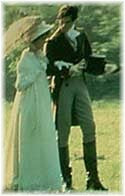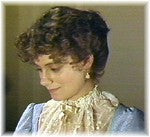Article: Pride and Prejudice: 1979
Pride and Prejudice: 1979
 In 1979, Pride and Prejudice was once again tapped for screen material. This time it was the BBC who put forth their efforts on behalf of Jane Austen (though the forty years between tries were by no means the "Dark Ages". There were several television and radio adaptations, which sadly have not been transferred to video. I am concentrating on the video adaptations at this time.) This Pride and Prejudice (P&P1) was shown in the USA in five episodes on Masterpiece Theater between October 26 and November 23, 1980. Directed by Cyril Coke (known for his other Masterpiece Theater work including "Upstairs, Downstairs"), the script was this time written by noted novelist Fay Weldon. It took Ms. Weldon (who had never before done a television script and is currently working on two new Jane Austen scripts, one for Sanditon, the other for The Bennet Boys, a modernization of Pride and Prejudice) four years to complete her screenplay, in which she introduced an element which would be used for years to come in many other Jane Austen adaptations, namely, the voice over.
In 1979, Pride and Prejudice was once again tapped for screen material. This time it was the BBC who put forth their efforts on behalf of Jane Austen (though the forty years between tries were by no means the "Dark Ages". There were several television and radio adaptations, which sadly have not been transferred to video. I am concentrating on the video adaptations at this time.) This Pride and Prejudice (P&P1) was shown in the USA in five episodes on Masterpiece Theater between October 26 and November 23, 1980. Directed by Cyril Coke (known for his other Masterpiece Theater work including "Upstairs, Downstairs"), the script was this time written by noted novelist Fay Weldon. It took Ms. Weldon (who had never before done a television script and is currently working on two new Jane Austen scripts, one for Sanditon, the other for The Bennet Boys, a modernization of Pride and Prejudice) four years to complete her screenplay, in which she introduced an element which would be used for years to come in many other Jane Austen adaptations, namely, the voice over. In the book A Decade of Masterpiece Theater, Alistair Cooke notes that: "The chief technical problem for the adapter is that of dealing with a medium that is mainly one of dialogue. In all her novels, Jane Austen’s narrator is a dual character: the heroine as participant and the heroine (J.A.?) as onlooker. What is fatal to all stage versions of Jane Austen is their dependence on dialogue. . .Miss Weldon solved this by adopting the convention of having Elizabeth Bennet seen as the central character and heard as the "voice over" commentator."Miss Weldon, once criticized for declaring that Jane Austen was not television friendly (dialogue-wise) and could use help shaping thoughts for modern viewers, says of the book: "It has a multilayered density. You begin with what appears to be a small, beautifully neat book, exquisitely confined, and as you work on it, it swells up like rice. . .and you respond to the other layers to the skill of the writing, the fineness of the observation."
Reviews of the mini-series were glowing. The New York Times’ John O’Conner declared, "The brittle romance of clever Elizabeth and proud Darcy remains a model of charm, distinctively British. As usual in a BBC production the sets and costumes are splendid and the performances are of an impressively high caliber."
In the book A Decade of Masterpiece Theater, Alistair Cooke notes that: "The chief technical problem for the adapter is that of dealing with a medium that is mainly one of dialogue. In all her novels, Jane Austen’s narrator is a dual character: the heroine as participant and the heroine (J.A.?) as onlooker. What is fatal to all stage versions of Jane Austen is their dependence on dialogue. . .Miss Weldon solved this by adopting the convention of having Elizabeth Bennet seen as the central character and heard as the "voice over" commentator."Miss Weldon, once criticized for declaring that Jane Austen was not television friendly (dialogue-wise) and could use help shaping thoughts for modern viewers, says of the book: "It has a multilayered density. You begin with what appears to be a small, beautifully neat book, exquisitely confined, and as you work on it, it swells up like rice. . .and you respond to the other layers to the skill of the writing, the fineness of the observation."
Reviews of the mini-series were glowing. The New York Times’ John O’Conner declared, "The brittle romance of clever Elizabeth and proud Darcy remains a model of charm, distinctively British. As usual in a BBC production the sets and costumes are splendid and the performances are of an impressively high caliber."
 Again, in the Masterpiece Theater book, Alistair Cooke proclaims, "This adaptation demonstrated a fine ear for the spare, exquisite language of the original and a ready talent for taking Jane’s maliciously cheerful view of social pretension. The result was as true a rendering of the essential Austen as we are likely to get. Viewers who dislike Pride and Prejudice do not like Jane Austen."
This is, of course, his opinion and there are people who would argue with that, after viewing the newer, 1995 version (though Amazon.com boasts sales of almost 9,000 copies of the video. They say it is particularly popular in Taiwan, being listed ninth on the favorite’s list.) To be sure the actors here, Elizabeth Garvie and David Rintoul, do not carry the same star power of the leads in other versions, however, this adaptation does include some unique features. Note, for instance, the inclusion of Lizzy’s conversation with her Aunt Gardiner on the subject of Mr. Wickham (she promises not to be taken in by him) and the interesting, invented scene concerning Mr. Collin’s "Aquatic Life Hat". Who says Mr. Darcy was the first to take the plunge into a lake?
Again, in the Masterpiece Theater book, Alistair Cooke proclaims, "This adaptation demonstrated a fine ear for the spare, exquisite language of the original and a ready talent for taking Jane’s maliciously cheerful view of social pretension. The result was as true a rendering of the essential Austen as we are likely to get. Viewers who dislike Pride and Prejudice do not like Jane Austen."
This is, of course, his opinion and there are people who would argue with that, after viewing the newer, 1995 version (though Amazon.com boasts sales of almost 9,000 copies of the video. They say it is particularly popular in Taiwan, being listed ninth on the favorite’s list.) To be sure the actors here, Elizabeth Garvie and David Rintoul, do not carry the same star power of the leads in other versions, however, this adaptation does include some unique features. Note, for instance, the inclusion of Lizzy’s conversation with her Aunt Gardiner on the subject of Mr. Wickham (she promises not to be taken in by him) and the interesting, invented scene concerning Mr. Collin’s "Aquatic Life Hat". Who says Mr. Darcy was the first to take the plunge into a lake?
 The most obvious difficulty this film may have in measuring up to the two other versions is in a lack of budget money. Both the 1940 version and the 1995 re-make benefited from large "Hollywood" type budgets (P&P2 featured the largest mini-series budget to date). The indoor scenes are obviously filmed on television sets, versus the luxurious houses and estates used in the 1995 version and the costumes somewhat less opulent, though tremendously more accurate than it’s predecessor’s. Especially worthy of special mention is Malcolm Rennie’s portrayal of Mr. Collins. Garvie is spirited and witty as Elizabeth, Rintoul, a proud and distant Darcy. Who could ask for anything more?
Laura Sauer is a milliner and runs Austentation, a site specializing in Regency accessories and custom made hats, bonnets and reticules.
Enjoyed this article? Visit our giftshop and escape into the world of Jane Austen for more Regency recipes.
The most obvious difficulty this film may have in measuring up to the two other versions is in a lack of budget money. Both the 1940 version and the 1995 re-make benefited from large "Hollywood" type budgets (P&P2 featured the largest mini-series budget to date). The indoor scenes are obviously filmed on television sets, versus the luxurious houses and estates used in the 1995 version and the costumes somewhat less opulent, though tremendously more accurate than it’s predecessor’s. Especially worthy of special mention is Malcolm Rennie’s portrayal of Mr. Collins. Garvie is spirited and witty as Elizabeth, Rintoul, a proud and distant Darcy. Who could ask for anything more?
Laura Sauer is a milliner and runs Austentation, a site specializing in Regency accessories and custom made hats, bonnets and reticules.
Enjoyed this article? Visit our giftshop and escape into the world of Jane Austen for more Regency recipes.
1 comment
It appears that Mr. Collins aquatic life hat contained plastic. I don’t think that would have been invented yet. It was pretty silly and fitting with his character though.
John Mulgrew
Leave a comment
This site is protected by hCaptcha and the hCaptcha Privacy Policy and Terms of Service apply.